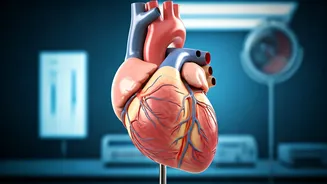Dietary Modifications Matter
The first step toward a heart-healthy life after 30 revolves around making smart dietary choices. It's time to embrace a balanced eating plan that actively
supports cardiovascular health. Start by reducing your intake of saturated and trans fats found in processed foods and red meats. Increase your consumption of heart-healthy fats, such as those found in olive oil and fatty fish like salmon, which provide omega-3 fatty acids. These fats are linked to lower cholesterol levels and reduced inflammation. Furthermore, incorporate plenty of fruits, vegetables, and whole grains into your meals. Focus on fiber-rich foods, as these can help lower cholesterol. Include cruciferous vegetables like broccoli and cauliflower, which offer antioxidants that protect against heart disease. Be mindful of portion sizes and avoid overeating, as this can lead to weight gain and increase your risk of heart problems. A diet rich in foods that instantly lower uric acid levels is also beneficial, as this can prevent gout, which can strain the heart. Examples include cranberries, beetroot, and pomegranate. By consistently choosing the right foods, you lay a solid foundation for a healthy heart.
Manage Daily Stress
Chronic stress significantly affects heart health, and therefore, learning effective management techniques is essential. Stress causes the release of hormones that can raise blood pressure and increase the risk of heart attacks and strokes. Implement stress-reduction methods like yoga, meditation, or deep-breathing exercises. Dedicate time each day to these practices to help calm the mind and body. Ensure you get enough quality sleep, as sleep deprivation can worsen stress levels. Aim for 7-9 hours of restful sleep each night to allow your body to recover and regulate hormone levels. Develop healthy coping mechanisms to deal with stressful situations rather than turning to unhealthy habits such as smoking or excessive alcohol consumption. Engage in activities that bring you joy, like spending time with loved ones or pursuing hobbies. Building a supportive social network is crucial, as this provides emotional support and reduces feelings of isolation, which can exacerbate stress. By proactively managing stress, you create a buffer that protects your heart and promotes overall well-being.
Exercise Regularly Always
Regular physical activity is a cornerstone of heart health, and after 30, it becomes even more vital. Exercise strengthens the heart muscle, improves blood circulation, and helps maintain a healthy weight. Aim for at least 150 minutes of moderate-intensity exercise per week, such as brisk walking, cycling, or swimming. If your schedule permits, you can divide this time into shorter bursts throughout the day. Include strength training exercises at least twice a week. These exercises can help build muscle mass and increase your metabolism, supporting weight management. Consider incorporating a mix of aerobic and strength training. This combination offers comprehensive benefits for your heart and overall health. Consult with your doctor or a fitness professional to create a workout routine suitable for your fitness level and any underlying health conditions. Make exercise a consistent part of your routine, and try different activities to keep things interesting. Consistency is key, and finding activities that you enjoy will make it easier to stick to your exercise goals. Regular physical activity reduces the risk of heart disease and boosts overall energy levels, and contributes to improved mental well-being.
Get Regular Health Checkups
Regular medical checkups are essential for monitoring your heart health and detecting potential issues early. Schedule annual checkups with your doctor and be proactive about your health. These checkups typically include blood pressure, cholesterol, and blood sugar level checks, which are crucial indicators of heart health. Discuss your family history of heart disease with your doctor, as this information can help assess your personal risk. Be prepared to answer questions about your lifestyle, including your diet, exercise habits, and stress levels. If necessary, your doctor may recommend further tests, such as an electrocardiogram (ECG) or stress test, to assess your heart's function. Pay attention to any unusual symptoms, such as chest pain, shortness of breath, or palpitations, and report these promptly to your doctor. Don’t hesitate to ask questions. Understanding your health metrics will empower you to make informed decisions and take the necessary steps to protect your heart. Proactive health management allows for early detection and intervention, reducing the risk of serious cardiac events and improving long-term health outcomes.













